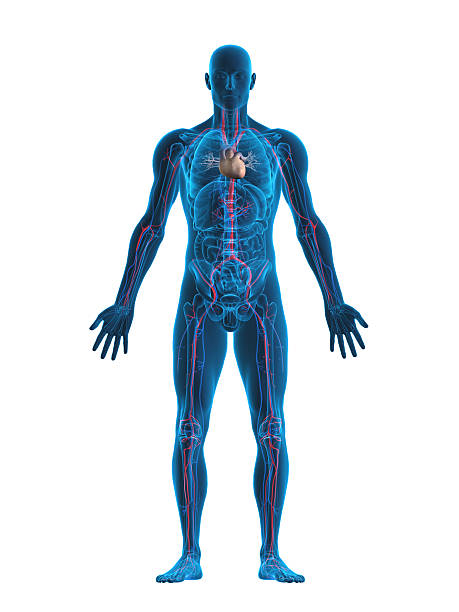Blood pressure is measured by systolic over diastolic pressure. Systolic refers to the pressure when the heart is beating, and diastolic refers to the pressure when the heart rests between beats. For an average adult, a blood pressure reading is considered normal if it’s below 120/80 mmHg.
Circulatory system
Damage caused by high blood pressure starts small and builds over time. The longer it goes undiagnosed or uncontrolled, the more serious your risks. Your blood vessels and major arteries carry blood throughout the body and supply it to vital organs and tissue. When the pressure at which blood travels gets increased, it begins to damage artery walls. Damage starts as small tears. As these artery wall tears begin to form, bad cholesterol flowing through the blood starts to attach itself to the tears. More and more cholesterol builds up in the walls, making the artery narrow. Less blood is able to get through. When the proper amount of blood can’t move through a blocked artery, it causes damage to the tissue or organ it’s supposed to reach. In the heart, this can mean chest pain, irregular heartbeat, or a heart attack. The heart also has to work harder, but is less effective with high blood pressure and blocked arteries. Eventually, the extra work can lead to an enlarged left ventricle, which is the part of the heart that pumps blood to the body. This also puts you at a higher risk of having a heart attack. Heart failure is when your heart becomes so weak and damaged from high blood pressure, working hard, or a previous heart attack, that it stops being able to pump blood through your body effectively. Signs of heart failure include:- shortness of breath
- trouble breathing
- swelling in the feet, ankles, legs, or abdomen
- feeling tired
High blood pressure may play a role in dementia and cognitive decline over time. Reduced blood flow to the brain causes memory and thinking problems. You might have trouble remembering or understanding things, or lose focus during conversations.
The same damage that high blood pressure causes to blood vessels and arteries in the heart can happen to the arteries in the brain. When a larger blockage of blood to the brain occurs, it’s called a stroke. If parts of the brain can’t get the oxygen they receive from blood, cells begin to die.
Your survival rate and likelihood of permanent brain damage depends on how severe the stroke is and how fast you receive treatment.
Blood vessels in the eyes can be damaged as well. If they burst or bleed, it can cause vision difficulties, like blurriness or blindness. Fluid buildup under the retina is called choroidopathy.
Skeletal system
High blood pressure can cause bone loss, known as osteoporosis, by increasing the amount of calcium your body gets rid of when you urinate. Women who have already gone through menopause are especially at risk. Osteoporosis weakens your bones and makes it easier for fractures and breaks to happen.Respiratory system
Like the brain and heart, arteries in the lungs can be damaged and blocked. When the artery that carries blood to your lungs gets blocked, it’s called a pulmonary embolism. This is very serious and requires immediate medical attention. An aneurysm can also happen in the lung. Sleep apnea is a sleep disorder that causes loud snoring and breathing interruptions during a night’s sleep. People with sleep apnea often don’t feel rested when they wake up in the morning. Research has linked the condition to high blood pressure, since many people who are diagnosed with sleep apnea also have high blood pressure.Reproductive system
Your sexual organs use extra blood flow during arousal. When high blood pressure causes blockages to the blood vessels leading to the penis or vagina, sexual dysfunction may occur. Men may have a hard time getting and maintaining an erection and women might experience:- decreased arousal
- vaginal dryness
- trouble having an orgasm
Urinary system
Your kidneys help remove waste from the blood, regulate blood volume and pressure, and filter waste out through urine. In order to do this well, they need healthy blood vessels. High blood pressure can damage the larger blood vessels leading to your kidneys and the smaller vessels inside your kidneys. Over time, this damage prevents the kidneys from doing their job properly. This is called kidney disease and can lead to kidney failure. High blood pressure is one of the major causes of kidney failure. People with kidney failure no longer have the ability to remove waste from their body and will either need dialysis or a transplant.Takeaway
Hypertension causes damage slowly over a long period of time without noticeable symptoms. That’s why it’s important to practice healthy habits, like regular exercise and eating a diet that’s low in sugar, salt and unhealthy fats. You should also have your blood pressure checked and know your numbers. Blood pressure can be managed and being aware of your high blood pressure can help you and your doctor to control it better.Left undetected or uncontrolled, high blood pressure can lead to: Heart attack — High blood pressure damages arteries that can become blocked and prevent blood flow to the heart muscle. Stroke — High blood pressure can cause blood vessels that supply blood and oxygen to the brain to become blocked or burst.






